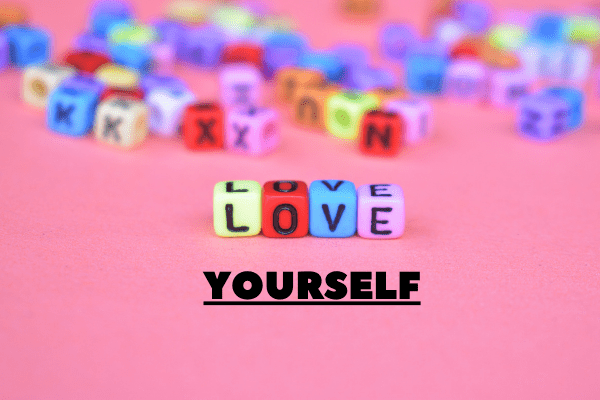Disclaimer: This post may contain affiliate links, meaning we get a small commission if you make a purchase through our link at no extra cost to you. For more information, please visit our Disclaimer Page.
Most days, life pulls you in a million directions, and it’s easy to lose sight of yourself in the chaos. Guys especially can find it tough to carve out time to find ways to practice self love when everything demands your energy.
You might be handling work, relationships, or just trying to stay ahead, and before you know it, self-care slips to the bottom of the list.
I’ve been there, too—feeling burned out, wondering how to refill my tank when everything felt dry.
But the truth is, showing up for yourself isn’t selfish; it’s survival.
You deserve to treat yourself like someone worth rooting for, because you are. Let’s talk about how to actually make it happen.
Table of Contents
What Is Self-Love?
Ever wonder what all this self-love talk is about? Let’s break it down in plain language.
Self-love isn’t just a buzzword. It’s about treating yourself with the same kindness you’d show a good friend. Think about it—would you tell your best friend they’re worthless? That they’re not good enough? Of course not! Yet we say these things to ourselves all the time.
Self-love means being your own biggest cheerleader. It’s giving yourself a high-five when you crush it, and a compassionate pep talk when you stumble. It’s setting boundaries and saying “no” to what drains you, while saying “yes” to what fills you up.
At its core, self-love is accepting all parts of yourself—your strengths AND your flaws—and knowing you’re worthy exactly as you are.
But here’s what many people get wrong: self-love isn’t selfish. It’s like putting on your own oxygen mask first on an airplane. When you take care of yourself, you have so much more to give others.
What Self-Love Is NOT
Before we go further, let’s clear up some misconceptions. Self-love is often misunderstood, so here’s what it’s NOT:
- It’s NOT being narcissistic or thinking you’re better than everyone else
- It’s NOT ignoring your flaws or never trying to improve
- It’s NOT an excuse to be inconsiderate of others’ feelings
- It’s NOT about always feeling fantastic or never having bad days
- It’s NOT indulging in every whim or being reckless with your health or finances
- It’s NOT fishing for compliments or needing constant validation
- It’s NOT about comparing yourself to others or trying to be perfect
True self-love is humble, authentic, and balanced. It acknowledges that you’re human while still honoring your inherent value.

Why Is Practicing Self-Love So Important?
You might be thinking, “Okay, but why should I prioritize self-love when I have so many other things to worry about?” Great question!
The truth is, self-love impacts literally every area of your life:
- It boosts your confidence. When you love yourself, you’re more likely to go after that promotion, start that business, or ask out that person you’ve been crushing on.
- It helps you bounce back from setbacks. Life will knock you down—that’s guaranteed. Self-love is what helps you get back up again.
- It improves your relationships. How you treat yourself sets the standard for how others treat you. When you know your worth, you naturally attract people who value you properly.
- It reduces stress and anxiety. When you’re not constantly beating yourself up, your mental health improves dramatically.
- It fuels personal growth. With self-love, you’ll push yourself to learn and improve not out of self-hate, but from a place of care and respect for yourself.
Remember: people will treat you based on how you treat yourself. It shows in your words, your actions, and your energy. When you practice self-love, others pick up on that self-respect.
Self-Love for Men: Breaking the Stigma
Men often get a raw deal when it comes to self-love. Society tells them to “man up” and not focus on feelings, which makes the whole concept seem foreign or even weak. But here’s the truth: self-love is not gendered.
Men need self-love just as much as anyone else—maybe even more, considering how rarely they’re encouraged to explore it. The pressure to always be strong, never vulnerable, and constantly achieving can create a perfect storm for self-criticism.
How Does a Man Find Himself?
I get this question a lot, especially from men who feel lost or disconnected from who they really are. Finding yourself as a man often involves:
- Questioning the “shoulds”: What parts of your life are based on what others think you should do versus what actually resonates with you?
- Exploring your values: What matters most to you? Not to your father, your friends, or society—but to YOU?
- Making space for emotions: Contrary to popular belief, acknowledging your full emotional range doesn’t make you weak—it makes you whole.
- Finding your purpose: What gets you out of bed in the morning? What contribution do you want to make?
- Building meaningful connections: Surround yourself with people who accept the real you, not just the version you think you need to be.
The journey to finding yourself isn’t linear, and it doesn’t have an endpoint. It’s an ongoing process of discovery and growth.
Reddit Insights: How Men Learn to Love Themselves
If you’ve ever browsed Reddit threads about self-love for men, you’ll notice some common themes. Here’s what real men have shared about their journey to self-love:
- Physical activity matters: Many men report that regular exercise not only improved their physical health but also their relationship with their bodies and minds.
- Finding healthy male role models: Looking up to men who embody healthy self-love can provide a roadmap for your own journey.
- Therapy works: Men who overcame the stigma and tried therapy often describe it as transformative for their self-image.
- Hobbies build confidence: Pursuing activities that bring joy and a sense of accomplishment creates a positive feedback loop.
- Redefining masculinity: Many men found freedom in creating their own definition of what it means to be a man rather than trying to fit someone else’s mold.
The takeaway? There’s no one-size-fits-all approach to self-love for men, but connecting with others who are on the same journey can provide valuable insights and support.
Essential Books on Self-Love for Men
If you’re looking to dive deeper, here are some books specifically addressing self-love for men:
- “The Mask of Masculinity” by Lewis Howes
- “Self-Compassion” by Dr. Kristin Neff
- “King, Warrior, Magician, Lover” by Robert Moore and Douglas Gillette
- “The Gifts of Imperfection” by Brené Brown
- “No More Mr. Nice Guy” by Robert Glover
These books tackle different aspects of male identity and provide practical tools for developing a healthier relationship with yourself.
Self-Love for Women: Embracing Your Worth
Women face unique challenges when it comes to self-love. From impossible beauty standards to the pressure to be everything to everyone, society often sends messages that can undermine female self-worth.
For women, self-love often means:
- Saying no without guilt: Setting boundaries around your time and energy
- Accepting your body: Appreciating what your body DOES rather than obsessing over how it LOOKS
- Taking up space: Speaking your mind without apologizing for having opinions
- Prioritizing your dreams: Not putting your goals on hold for everyone else’s
- Embracing your authentic self: Letting go of who you “should” be to become who you are
Remember, self-love for women isn’t about perfection—it’s about accepting yourself as you are while still growing into the person you want to become.
How to Help Someone Love Themselves
Maybe you’re reading this not just for yourself but because you care about someone who struggles with self-love. Whether it’s a partner, friend, or family member, here’s how you can help:
- Model self-love: Show them what healthy self-regard looks like through your own actions.
- Offer specific, genuine praise: Instead of generic compliments, point out specific qualities and actions you admire.
- Create safe spaces: Allow them to express themselves without judgment.
- Challenge negative self-talk: Gently question when they speak harshly about themselves.
- Support their growth: Encourage them to pursue interests and activities that make them feel good about themselves.
- Be patient: Self-love develops over time, not overnight.
Remember, you can’t love someone into loving themselves, but you can create conditions that make it easier for them to discover their own worth.
4 Practical Ways to Practice Self-Love Daily
Enough theory—let’s get practical! Here are four actionable ways to practice self-love in your everyday life:
1. Challenge Those Negative Thoughts
We all have that inner critic that loves to point out our flaws and limitations. The key is not to own those thoughts when they pop up.
When a negative thought creeps in, don’t accept it as truth. Instead, question it! Why am I thinking I can’t do this? Is that actually true?
Try this technique: Immediately swap destructive thoughts for constructive ones.
Destructive: “I’ve always failed at relationships. Why even try again?” Constructive: “Each relationship teaches me something new about myself and what I need in a partner.”
Destructive: “I’m not qualified for this opportunity.” Constructive: “I can equip myself with the skills needed for this opportunity.”
Destructive: “No one in my family has ever succeeded at this, so I probably won’t either.” Constructive: “I can be the first in my family to break this pattern and set a new example.”
Challenge each negative thought. Be your own advocate rather than your own worst critic.
2. Be a Realist, Not a Perfectionist
Here’s a liberating truth: failure isn’t the end of the road. It’s just one path that didn’t work out.
Think of failure like using GPS. When you take a wrong turn, your GPS doesn’t say, “You’re hopeless at navigation! Give up driving forever!” It simply recalculates and shows you another route.
Perfectionism says, “Do it flawlessly or don’t do it at all.” Realism says, “Do your best with what you have, learn from mistakes, and improve over time.”
No one gets it perfect on the first, second, or even third try. But each attempt teaches you something valuable that brings you closer to success.
Aim for progress, not perfection. Your self-love shouldn’t be conditional on flawless performance.
3. Step Out of Your Comfort Zone

Growth and comfort rarely coexist. When you try something completely new—something outside your comfort zone—you stretch your perception of what you’re capable of.
Yes, it’s scary. Yes, you might fail at first. But each time you step into unfamiliar territory and survive (or even thrive!), you build undeniable evidence of your capabilities.
Start small. You don’t need to make a radical life change overnight. Maybe it’s speaking up in a meeting when you’d usually stay quiet. Perhaps it’s trying a hobby that’s always intimidated you. Or maybe it’s having that difficult conversation you’ve been avoiding.
This will consequently teach you how to have a greater sense of confidence.
4. End the Negative Comparisons
In today’s social media age, comparison is more tempting than ever. But comparing your behind-the-scenes to everyone else’s highlight reels is a recipe for misery.
Remember:
- You don’t know others’ full journeys or struggles
- Someone else’s success doesn’t diminish your worth
- Your unique path can’t be compared to anyone else’s
- There will always be people ahead of you AND behind you
Instead of measuring yourself against others, compare yourself to who YOU were yesterday. Are you growing? Learning? Becoming more of who you want to be? That’s the only comparison that matters.
Focus on making YOUR life better—not matching someone else’s. Celebrate others’ successes while honoring your own journey.
Self-Love Quotes to Inspire You
Sometimes, a powerful quote can shift your perspective instantly. Here are some thought-provoking quotes on self-love to inspire your journey:
“You yourself, as much as anybody in the entire universe, deserve your love and affection.” — Buddha
“Until you value yourself, you won’t value your time. Until you value your time, you will not do anything with it.” — M. Scott Peck
“The most powerful relationship you will ever have is the relationship with yourself.” — Steve Maraboli
“To love oneself is the beginning of a lifelong romance.” — Oscar Wilde
“You have been criticizing yourself for years, and it hasn’t worked. Try approving of yourself and see what happens.” — Louise Hay
“The real difficulty is to overcome how you think about yourself.” — Maya Angelou
“You find peace not by rearranging the circumstances of your life, but by realizing who you are at the deepest level.” — Eckhart Tolle
Keep these quotes somewhere visible—your mirror, your phone wallpaper, or your desk—as daily reminders of your inherent worth.
20 Daily Self-Love Affirmations
Words have power, especially the ones we repeat to ourselves. Try incorporating these affirmations into your daily routine:
- I am worthy of love and respect.
- My feelings matter.
- I trust my decisions.
- I am enough, just as I am.
- I celebrate my strengths.
- I embrace my imperfections.
- I forgive myself for past mistakes.
- I deserve happiness and success.
- My body is strong and capable.
- I am proud of my accomplishments.
- I choose positivity today.
- I am resilient in the face of challenges.
- I love and accept myself fully.
- I am confident in my abilities.
- I attract positive relationships.
- I am worthy of my dreams.
- I choose to be kind to myself.
- I am constantly growing and evolving.
- I trust the journey of my life.
- I radiate love and positivity.
Try reading these aloud each morning or before bed. The more you hear these truths, the more you’ll begin to believe them.
Final Thoughts: Your Self-Love Journey
Self-love isn’t a destination—it’s a practice. Some days will be easier than others, and that’s perfectly normal. The goal isn’t to feel amazing about yourself 24/7 (that would be unrealistic!). The goal is to develop a fundamentally compassionate relationship with yourself that weathers life’s inevitable ups and downs.
Remember:
- Focus on making your life better, not on pleasing others or matching anyone else’s lifestyle
- Loving yourself first isn’t selfish or conceited—it’s essential for genuine connection with others
- Do what’s best for you—living authentically and achieving your goals one day at a time
- Appreciate yourself and acknowledge what you’re capable of, even when it feels difficult
Today, commit to changing how you treat yourself. Start small, be consistent, and watch how your relationship with yourself—and everyone around you—transforms.
You’ve got this. And you’re worth it.
Lots of love!
What’s one small way you’ll practice self-love today? Share in the comments below!






